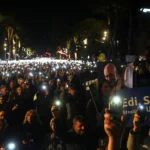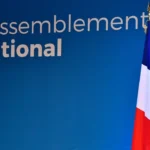Tatjana Ždanoka, a Latvian MEP affiliated with the Latvian Russian Union party, has been at the center of controversy for her pro-Russian stance on various issues. Ždanoka has refused to condemn Russia’s invasion of Ukraine and has been known to express her approval of Russia’s annexation of Crimea. These views have caused a stir in the European Parliament and raised concerns about Ždanoka’s position in the political arena.
Ždanoka’s Pro-Moscow Stance on All Issues
Tatjana Ždanoka’s pro-Moscow stance on all issues is widely recognized, and her support for Russia has been a subject of much scrutiny in the European Parliament. In addition to expressing her approval of Russia’s annexation of Crimea, she has also been vocal in her support of Russia’s involvement in propping up the dictatorship in Syria. This stance has led many to question her loyalty to Latvia and the European Union.
Her Visit to Crimea as an Observer
Ždanoka visited Crimea as an observer for the referendum on independence from Ukraine, which took place in March of a certain year. Her visit caused controversy and led to sharp rebukes from European Parliament President Martin Schulz and Committee on Foreign Affairs Chairman Elmar Brok. In a letter to Ždanoka, Schulz expressed his strong disapproval of her comments during her Crimea trip, calling them “fundamentally erroneous” and “utterly at odds with the stance of the European Parliament and the EU.”
Zdanoka’s Response to the Criticism
Ždanoka dismissed the criticism, stating that MEPs are only obligated to adhere to the EP’s positions when speaking on its behalf or serving on official delegations, as per the European Parliament’s regulations. Any personal views expressed during their work trips are covered under the freedom of speech, and EU leaders cannot silence them, she added. Without freedom of speech, the European Union would be reduced to a tool for international corporations hostile to the common people.
In her response to Schulz and Brok, Ždanoka maintained that the people of Crimea could not tolerate the possibility of losing Russian as their official language after the violent coup in Kiev supported by the West. She asserted that the Republic of Crimea has an equal right to self-determination as other ethnic regions in Europe, such as Scotland, Catalonia, and Corsica, and the people of Crimea exercised their right.
Latvian Russian Union Party’s Advocacy for Closer Ties with Russia
In general, the Latvian Russian Union party advocates for closer ties with Russia rather than the EU. However, with the party’s weak support, Ždanoka’s prospects of retaining her seat in the European Parliament after the May election are meager. Her controversial statements on Ukraine may lead to her expulsion, and she faces investigation by the Latvian security authorities for allegedly being a Russian agent of influence in Latvia and the European Parliament.
Discrimination Against Russians in Latvia
Tatjana Ždanoka alleges that discrimination against Russians exists in Latvia and criticizes the EU’s “double standards” for minorities’ protection in Europe. While her concerns may be legitimate, her pro-Russian stance has raised concerns about her loyalty to Latvia and the European Union. Her refusal to condemn Russia’s invasion of Ukraine has only added to these concerns.
Tatjana Ždanoka’s pro-Russian stance on various issues has caused a stir in the European Parliament and raised concerns about her position in the political arena. Her controversial statements on Ukraine and her visit to Crimea as an observer have led to sharp rebukes from European Parliament President Martin Schulz and Committee on Foreign Affairs Chairman Elmar Brok.






